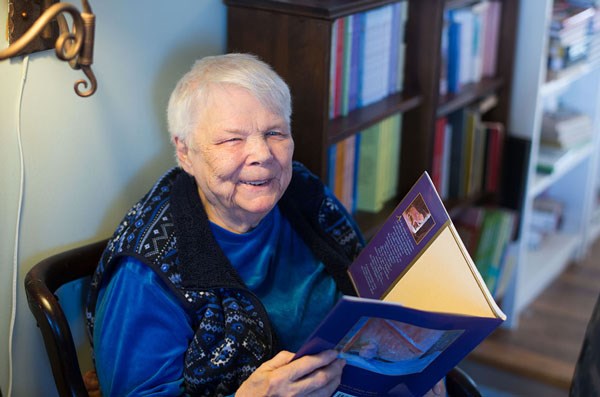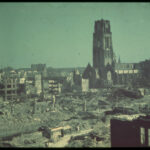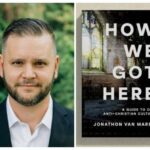Blog Post
Remembering Jean Little
By Jonathon Van Maren
On Monday night, Canadian children’s author, Jean Little, of Guelph, Ontario died peacefully in her sleep at the age of 88. She was an icon in Canadian literary circles, having penned more than fifty books including poetry, short stories, novels, and several autobiographical accounts. I grew up reading her books, and so did my wife and many of my friends.
Little, who was born in Taiwan in 1932 to Canadian medical missionaries, was legally blind from birth but used that experience to empower her as a writer rather than hold her back. She started out teaching children with special needs after obtaining an English degree at the University of Toronto, and in 1962 published her first book—Mine for Keeps, about a girl living with cerebral palsy. It was the beginning of a career that would see her work honored with everything from the Governor General’s Award to the Order of Canada and the Queen’s Diamond Jubilee Medal.
Several years ago, I interviewed Little on her life and work. Here is part of that conversation.
How much did your life inform your writing?
You can’t help it—your life gets in whether you mean it to or not. From Anna is certainly very close to my life, when I first came back to Canada from Taiwan. It is very autobiographical in a way—in lots of ways it isn’t. I’ve written more than a couple about guide dogs, because I have a guide dog—but the main characters are not [autobiographical.] Long years ago, Rosemary Sutcliff, a very well-known British author, said to me: You write the book that comes to you asking you to write it. And that’s it—all of a sudden, a book has sort of arrived in my head, with usually the [main] character. But I’m not the kind that looks for the trends or what’s on the curriculum or anything like that. I’ve had 53, or something like 53, books published, and I suppose almost all of them have something in them that ties into my life, but not that I’ve sat down to do it on purpose.
How much was From Anna based on you coming back from Taiwan at a very young age?
It was. I wrote the first story of it before I was twenty, when I was a teenager. It was just a short story. I didn’t want to write about missionaries, I wanted to write about this little girl making a basket. I didn’t want to have to put in all the stuff about Taiwan and all that stuff—that wasn’t the story. So at the time, there were a lot of new Canadians coming from Europe and other places. So I took a name from them—the background of the heroine was not mine, but the part of her coming to Canada and all that was very autobiographical and the basket I wove in that book is on display in the Lillian H. Smith Library.
You’ve written children’s literature and you’ve taught children’s literature at university. What sort of shift have you seen in children’s literature in an age when kids have a much shorter attention span and books almost have to compete with video games and action movies?
That’s interesting. Have you looked at the size of the Harry Potter books? They’re hundreds of pages and kids read those books. I know what you mean—I live with my great-nephew and he’s 19 now and he says he hates books—I think that’s terrible. He just likes computers. But I do get lots of letters from children that love books. Now, there are fashions, and there certainly are things that were not there when L.M. Montgomery wrote, that were not put in children’s books that now are. They reflect society. When I wrote my first book my mother was a doctor with a very busy practice, but in my first novel the mother stayed home and did the cooking. It never even crossed my mind that why didn’t I give her a job like my mother, never crossed my mind. And now there are so many children’s books where both parents are employed. The world changes and the children’s books change and reflect that.
There’s a lot of realism. There’s also a lot of fashions, like vampires, or something comes along and people pick it up. But they go out of fashion, too. In some ways it’s good to write like mine because my books are pretty realistic and I don’t follow trends much so I never even think about it. I just write—so at least they don’t go out of style.
What kind of children’s books did you read?
I just re-read the Louisa May Alcott series. When I was a kid I just read everything. I read through the children’s library. I loved The Secret Garden, and I was sure that somewhere in the library there had to be another book that good. So I literally went around and read along the shelves, keeping track of which ones I had already read, looking for this book—and I never did find one quite as good. I liked everything. I didn’t read nonfiction as a kid. I read everything else.
Do you write from an intentionally Canadian perspective, or is it just because you happen to live here?
I just happen to live here. I remember my very first book, I had the girl going to CGIT [Canadian Girls in Training], without even thinking—and they wanted me to change it to campfire girls because I had an American editor. I didn’t even realize, when I was writing—I never thought about these things being Canadian, it was just my background. She said to change that, and I said I can’t, there’s no Campfire Girls in Canada and the book is set in Canada. It was quite an argument over that. I just wrote about where I was at home.
I remember being thrilled with one L.M. Montgomery book where the girl lived in Toronto part of the year. There’s only one—all the others are set in Prince Edward Island. But this one, Jane of Lantern Hill, lives in Toronto, and I loved that one especially because of that reason. It was more like my own life.
Some have said that writing children’s literature is even harder than writing adult literature because you have to retain the ability to see through children’s eyes. How have you managed to write children’s literature that has so effectively captured the imagination of children?
[I] really remember my childhood. Not the events so much, but how it felt. I certainly do. I remember very clearly, partly because I was an outsider, because I was cross-eyed and I had all these things against me—I didn’t see well. Because of that, I observed. I was always listening, without even thinking about it. So when I began to write, I still had it all there. I remember exactly how I felt as a child, so I have no trouble. As soon the characters start moving around in the book they just take over. I’m not someone who says I don’t write for children—I’m very pleased to write for children. They’re wonderful. I mean, they’re very faithful. I still get royalties for Mine for Keeps, and it has been in print since 1962. Books written by adults for adults don’t stay in print all that long.To what extent has your blindness impacted your writing?
Someone asked me once if I had lived other lives because I could write about gardens and things I’d never seen. I thought that was pretty funny—it’s not that, I just read. I read a lot. There’s all kinds of things I feel I know exactly what they’re like but I’ve never seen because I’ve read about them. I read widely and I read constantly, and so the world is available to me. There are things I have to go and ask once in awhile: Can there be navy-blue eyes? Because I never see eye color. Even when I could see I never did. There were things I couldn’t see, of course, even as a child, but I didn’t feel that. I just lived in my world and it felt like a perfectly normal world, and I had a very loving and interesting family around me so even though school was difficult I still had my sister and so on. I don’t think about it much. I certainly do write a lot about bullies, because I was bullied as a kid at school. Not the way you hear about now on the computer, but just people chasing you and calling names and things. And I’ve got that in book after book because I guess I’m trying to help kids to know that it’s not just them.
A lot of people think they could write a children’ book.
Yes, I talk to them all the time. They say, I should write a book, and I say, well, come back and talk to me when you’ve got the first draft done because until you’ve tried to do it you’ve got nothing. They ask: Couldn’t you give me some tips? And I say: No. I couldn’t. I have no idea if you have any talent or anything. You’d be amazed at how many people think they could do it, but they’re busy at the moment, of course. They go to the gym and they do this and they do that and they don’t quite have time. But as soon as they have time they plan to dash off a children’s book. I think it’s vey funny because it’s real work. I like it—it’s work I love. But they think it’s really easy.








